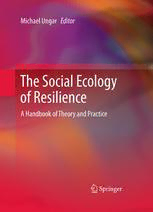Table Of ContentThe Social Ecology of Resilience
Michael Ungar
Editor
The Social Ecology
of Resilience
A Handbook of Theory and Practice
Editor
Michael Ungar
Killam Professor of Social Work
Dalhousie University
Halifax, NS, Canada
[email protected]
ISBN 978-1-4614-0585-6 e-ISBN 978-1-4614-0586-3
DOI 10.1007/978-1-4614-0586-3
Springer New York Dordrecht Heidelberg London
Library of Congress Control Number: 2011935367
© Springer Science+Business Media, LLC 2012
All rights reserved. This work may not be translated or copied in whole or in part without the
written permission of the publisher (Springer Science+Business Media, LLC, 233 Spring
Street, New York, NY 10013, USA), except for brief excerpts in connection with reviews or
scholarly analysis. Use in connection with any form of information storage and retrieval,
electronic adaptation, computer software, or by similar or dissimilar methodology now
known or hereafter developed is forbidden.
The use in this publication of trade names, trademarks, service marks, and similar terms, even if
they are not identified as such, is not to be taken as an expression of opinion as to whether or not
they are subject to proprietary rights.
Printed on acid-free paper
Springer is part of Springer Science+Business Media (www.springer.com)
Acknowledgements
To bring together a volume of this scope requires the efforts of many committed
individuals. I have to thank dozens of research assistants and colleagues affili-
ated with the Resilience Research Centre who helped to organize events that
brought together many of the authors who appear in this book, and who also
helped introduce me, during my travels, to the people doing the most innova-
tive work on resilience in the world. It is the vast network across dozens of
countries that the RRC sustains that makes a volume like this possible.
I also owe a debt of gratitude to my codirector at the RRC, Linda Liebenberg,
who helped with many of the logistical supports that made this book possible,
and Dorothy Bottrell for her helpful review of my own contributions.
Finally, a sincere thank you to my support team at Springer.
v
Contents
1 Introduction to the Volume ........................................................ 1
Michael Ungar
Part I Introduction to the Theory
2 Social Ecologies and Their Contribution to Resilience............ 13
Michael Ungar
3 Resilience: Causal Pathways and Social Ecology ..................... 33
Michael Rutter
4 Theory and Measurement of Resilience:
Views from Development ............................................................ 43
Lewis P. Lipsitt and Jack Demick
5 Resilience and Children’s Work in Brazil:
Lessons from Physics for Psychology ........................................ 53
Piotr Trzesniak, Renata M. C. Libório, and Silvia H. Koller
Part II Five Interviews
6 An Interview with Macalane Malindi: The Impact
of Education and Changing Social Policy on Resilience
during Apartheid and Post Apartheid in South Africa ........... 69
Macalane Malindi and Michael Ungar
7 An Interview with Bill Strickland: How Community-Based
Adult Educational Facilities Can Lift People Out
of Poverty in Urban America ..................................................... 77
Bill Strickland and Michael Ungar
8 An Interview with Jude Simpson: Growing Beyond
a Life of Abuse and Gang Involvement in New Zealand ......... 85
Jude Simpson and Michael Ungar
9 An Interview with Vicki Durrant: Creating
a Community Program for High-Risk Aboriginal
Youth in Canada’s North ............................................................ 91
Vicki Durrant and Michael Ungar
vii
v iii Contents
10 An Interview with Arn Chorn-Pond: Helping
Children in Cambodia Through the Revival
of Traditional Music and Art ..................................................... 99
Arn Chorn-Pond and Michael Ungar
Part III The Individual (in Context)
11 From Neuron to Social Context: Restoring Resilience
as a Capacity for Good Survival ................................................ 111
Martha Kent
12 Situating Resilience in Developmental Context........................ 127
Laura M. Supkoff, Jennifer Puig, and L. Alan Sroufe
13 Temporal and Contextual Dimensions to Individual
Positive Development: A Developmental– Contextual
Systems Model of Resilience ...................................................... 143
Ingrid Schoon
14 Girls’ Violence: Criminality or Resilience? .............................. 157
Jean Hine and Joanna Welford
Part IV The Family
15 Facilitating Family Resilience: Relational Resources
for Positive Youth Development in Conditions
of Adversity .................................................................................. 173
Froma Walsh
16 Contexts of Vulnerability and Resilience: Childhood
Maltreatment, Cognitive Functioning and Close
Relationships ............................................................................... 187
Christine Wekerle, Randall Waechter, and Ronald Chung
17 Averting Child Maltreatment: Individual,
Economic, Social, and Community Resources
that Promote Resilient Parenting .............................................. 199
Kimberly DuMont, Susan Ehrhard-Dietzel,
and Kristen Kirkland
18 Caring Relationships: How to Promote Resilience
in Challenging Times .................................................................. 219
Gill Windle and Kate M. Bennett
19 Young People, Their Families and Social Supports:
Understanding Resilience with Complexity Theory ................ 233
Jackie Sanders, Robyn Munford, and Linda Liebenberg
Contents ix
Part V The School
20 Local Resources and Distal Decisions:
The Political Ecology of Resilience ............................................ 247
Dorothy Bottrell and Derrick Armstrong
21 Caring Teachers: Teacher–Youth Transactions
to Promote Resilience.................................................................. 265
Linda C. Theron and Petra Engelbrecht
22 Children with Disabilities and Supportive
School Ecologies .......................................................................... 281
Neerja Sharma and Rekha Sharma Sen
23 Resilience in Schools and Curriculum Design .......................... 297
Nan Henderson
Part VI The Community
24 How Prior Social Ecologies Shape Family
Resilience Amongst Refugees in U.S. Resettlement ................. 309
Stevan M. Weine, Elise Levin, Leonce Hakizimana,
and Gonwo Dahnweih
25 Young People, Sexual Orientation, and Resilience................... 325
Rebecca Harvey
26 Community Resilience: Fostering Recovery,
Sustainability, and Growth......................................................... 337
Kate Murray and Alex Zautra
27 The Social Ecology of Resilience in War-Affected Youth:
A Longitudinal Study from Sierra Leone ................................. 347
Theresa S. Betancourt
28 Travelling Through Social Support and Youth
Civic Action on a Journey Towards Resilience ........................ 357
Pat Dolan
Part VII Culture
29 Understanding Culture, Resilience,
and Mental Health: The Production of Hope ........................... 369
Catherine Panter-Brick and Mark Eggerman
30 Case Study: Promoting Community Resilience
with Local Values – Greenland’s Paamiut Asasara ................. 387
Peter Berliner, Line Natascha Larsen,
and Elena de Casas Soberón

